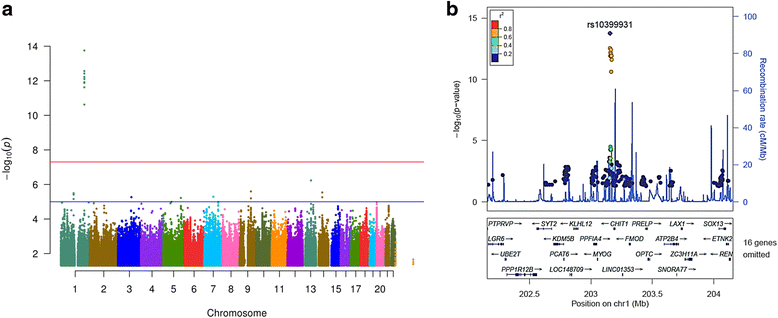Chitinase-3-like 1 protein (CHI3L1) locus influences cerebrospinal fluid levels of YKL-40
- PMID: 27832767
- PMCID: PMC5105244
- DOI: 10.1186/s12883-016-0742-9
Chitinase-3-like 1 protein (CHI3L1) locus influences cerebrospinal fluid levels of YKL-40
Abstract
Background: Alzheimer's disease (AD) pathology appears several years before clinical symptoms, so identifying ways to detect individuals in the preclinical stage is imperative. The cerebrospinal fluid (CSF) Tau/Aβ42 ratio is currently the best known predictor of AD status and cognitive decline, and the ratio of CSF levels of chitinase-3-like 1 protein (CHI3L1, YKL-40) and amyloid beta (Aβ42) were reported as predictive, but individual variability and group overlap inhibits their utility for individual diagnosis making it necessary to find ways to improve sensitivity of these biomarkers.
Methods: We used linear regression to identify genetic loci associated with CSF YKL-40 levels in 379 individuals (80 cognitively impaired and 299 cognitively normal) from the Charles F and Joanne Knight Alzheimer's Disease Research Center. We tested correlations between YKL-40 and CSF Tau/Aβ42 ratio, Aβ42, tau, and phosphorylated tau (ptau181). We used studentized residuals from a linear regression model of the log-transformed, standardized protein levels and the additive reference allele counts from the most significant locus to adjust YKL-40 values and tested the differences in correlations with CSF Tau/Aβ42 ratio, Aβ42, tau, and ptau181.
Results: We found that genetic variants on the CH13L1 locus were significantly associated with CSF YKL-40 levels, but not AD risk, age at onset, or disease progression. The most significant variant is a reported expression quantitative trait locus for CHI3L1, the gene which encodes YKL-40, and explained 12.74 % of the variance in CSF YKL-40 in our study. YKL-40 was positively correlated with ptau181 (r = 0.521) and the strength of the correlation significantly increased with the addition of genetic information (r = 0.573, p = 0.006).
Conclusions: CSF YKL-40 levels are likely a biomarker for AD, but we found no evidence that they are an AD endophenotype. YKL-40 levels are highly regulated by genetic variation, and by including genetic information the strength of the correlation between YKL-40 and ptau181 levels is significantly improved. Our results suggest that studies of potential biomarkers may benefit from including genetic information.
Keywords: Alzheimer disease; CHI3L1; Cerebrospinal fluid; YKL-40.
Figures
Similar articles
-
CSF tau and the CSF tau/ABeta ratio for the diagnosis of Alzheimer's disease dementia and other dementias in people with mild cognitive impairment (MCI).Cochrane Database Syst Rev. 2017 Mar 22;3(3):CD010803. doi: 10.1002/14651858.CD010803.pub2. Cochrane Database Syst Rev. 2017. PMID: 28328043 Free PMC article.
-
γ-Secretase activity, clinical features, and biomarkers of autosomal dominant Alzheimer's disease: cross-sectional and longitudinal analysis of the Dominantly Inherited Alzheimer Network observational study (DIAN-OBS).Lancet Neurol. 2024 Sep;23(9):913-924. doi: 10.1016/S1474-4422(24)00236-9. Epub 2024 Jul 26. Lancet Neurol. 2024. PMID: 39074479
-
CSF and blood biomarkers for the diagnosis of Alzheimer's disease: a systematic review and meta-analysis.Lancet Neurol. 2016 Jun;15(7):673-684. doi: 10.1016/S1474-4422(16)00070-3. Epub 2016 Apr 8. Lancet Neurol. 2016. PMID: 27068280
-
Comparative performance of plasma pTau181/Aβ42, pTau217/Aβ42 ratios, and individual measurements in detecting brain amyloidosis.medRxiv [Preprint]. 2025 May 30:2024.12.07.24318640. doi: 10.1101/2024.12.07.24318640. medRxiv. 2025. Update in: EBioMedicine. 2025 Jul;117:105805. doi: 10.1016/j.ebiom.2025.105805. PMID: 39830279 Free PMC article. Updated. Preprint.
-
Distinct CSF α-synuclein aggregation profiles associated with Alzheimer's disease phenotypes and MCI-to-AD conversion.J Prev Alzheimers Dis. 2025 Feb;12(2):100040. doi: 10.1016/j.tjpad.2024.100040. Epub 2025 Jan 3. J Prev Alzheimers Dis. 2025. PMID: 39863324 Free PMC article.
Cited by
-
Cerebrospinal Fluid YKL-40 and Chitotriosidase Levels in Frontotemporal Dementia Vary by Clinical, Genetic and Pathological Subtype.Dement Geriatr Cogn Disord. 2020;49(1):56-76. doi: 10.1159/000506282. Epub 2020 Apr 28. Dement Geriatr Cogn Disord. 2020. PMID: 32344399 Free PMC article.
-
The Chitinases as Biomarkers for Amyotrophic Lateral Sclerosis: Signals From the CNS and Beyond.Front Neurol. 2020 May 27;11:377. doi: 10.3389/fneur.2020.00377. eCollection 2020. Front Neurol. 2020. PMID: 32536900 Free PMC article. Review.
-
Neuroinflammatory fluid biomarkers in patients with Alzheimer's disease: a systematic literature review.Mol Psychiatry. 2025 Jun;30(6):2783-2798. doi: 10.1038/s41380-025-02939-9. Epub 2025 Mar 6. Mol Psychiatry. 2025. PMID: 40050444 Free PMC article.
-
Chi3l1/YKL-40 is controlled by the astrocyte circadian clock and regulates neuroinflammation and Alzheimer's disease pathogenesis.Sci Transl Med. 2020 Dec 16;12(574):eaax3519. doi: 10.1126/scitranslmed.aax3519. Sci Transl Med. 2020. PMID: 33328329 Free PMC article.
-
Glial activation and inflammation along the Alzheimer's disease continuum.J Neuroinflammation. 2019 Feb 21;16(1):46. doi: 10.1186/s12974-019-1399-2. J Neuroinflammation. 2019. PMID: 30791945 Free PMC article.
References
-
- Perrin RJ, Craig-Schapiro R, Malone JP, Shah AR, Gilmore P, Davis AE, Roe CM, Peskind ER, Li G, Galasko DR, et al. Identification and validation of novel cerebrospinal fluid biomarkers for staging early Alzheimer's disease. PLoS One. 2011;6(1):e16032. doi: 10.1371/journal.pone.0016032. - DOI - PMC - PubMed
-
- Harari O, Cruchaga C, Kauwe JS, Ainscough BJ, Bales K, Pickering EH, Bertelsen S, Fagan AM, Holtzman DM, Morris JC, et al. Phosphorylated tau-Abeta42 ratio as a continuous trait for biomarker discovery for early-stage Alzheimer's disease in multiplex immunoassay panels of cerebrospinal fluid. Biol Psychiatry. 2014;75(9):723–731. doi: 10.1016/j.biopsych.2013.11.032. - DOI - PMC - PubMed
MeSH terms
Substances
Grants and funding
LinkOut - more resources
Full Text Sources
Other Literature Sources
Medical


